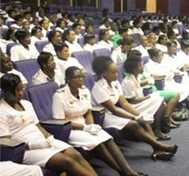Training 8,000 Healthcare Workers in Zimbabwe to Fight HIV/AIDS

Nurses in Harare, Zimbabwe
The global HIV/AIDS epidemic continues to be one of the most serious health problems facing Zimbabwe, where the prevalence of HIV in people aged 15-49 years is 14.9% and most patients receiving antiretroviral treatment still have to travel long distances to access care. While HIV prevalence declined by 50% between 2001 and 2011, for this trend to continue healthcare workers must be equipped with the necessary knowledge and skills to ensure universal access through decentralized HIV prevention, treatment, care and support services throughout the country.
In February 2014, the U.S. government, through PEPFAR, launched three programs to build local capacity and provide comprehensive services to combat HIV/AIDS in Zimbabwe. These programs, which are funded at $65 million over five years, will support training of more than 8,000 healthcare workers, provide clinical mentorship to healthcare workers at 1,500 sites, and have a strong monitoring and evaluation component. The programs, which target the most remote parts of the country, will be implemented by the Zimbabwe Association of Church-Related Hospitals and the International Training and Education Center for Heath (I-Tech) with technical support from CDC. Officiating at the launch of these programs in Harare, U.S. Ambassador to Zimbabwe, Bruce Wharton, said the U.S. government remains committed to partnering with Zimbabwe in the fight against HIV/AIDS.
Date: 2014
Zimbabwe Country Page
- Page last reviewed: February 3, 2015
- Page last updated: February 3, 2015
- Content source:


 ShareCompartir
ShareCompartir